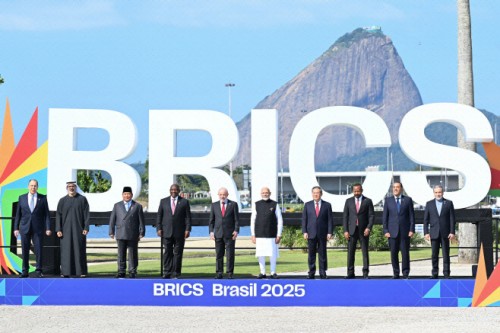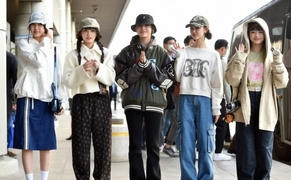 |
| Leaders and representatives from 10 countries, including Indonesian President Prabowo Subianto (third from left), South African President Cyril Ramaphosa, Brazilian President Luiz Inácio Lula da Silva, Indian Prime Minister Narendra Modi, and Chinese Premier Li Qiang, pose for a group photo at the 17th BRICS Summit in Rio de Janeiro, Brazil, on July 6. / Xinhua, Yonhap |
The Donald Trump administration’s high tariffs have triggered strong backlash from Brazil, South Africa, and India, all of which are seeking countermeasures such as retaliatory tariffs and export market diversification. These three nations are founding members of BRICS, the non-Western bloc led by China and joined by Russia.
Trump is reviewing an extension of the tariff truce with China, set to expire on August 11, while the deadline for imposing sanctions on Russia and its trading partners, announced on July 29, approaches on August 8.
On July 7, Trump declared via Truth Social that “all nations siding with BRICS’ anti-American stance will face an additional 10% tariff.” He also warned of a 100% tariff on Russia and its trade partners, expressing disappointment with President Vladimir Putin’s opposition to a Ukraine ceasefire.
Trump later announced tariffs of 50% on Brazil, 30% on South Africa, and 25% on India, citing reasons ranging from “Brazilian President Lula’s remarks labeling me an unnecessary emperor” to “white farmer killings” in South Africa and India’s trade barriers. He also threatened penalties on India for continuing to purchase Russian arms and energy.
On August 4, Trump warned that India’s purchase and resale of Russian oil was funding Moscow’s “war machine” and pledged to “raise tariffs substantially.”
Indian Foreign Ministry spokesperson Randhir Jaiswal hit back, stating on X, “Targeting India is unjustified and unreasonable. Like other major economies, India will take all necessary measures to safeguard national interests and economic security.” Jaiswal emphasized that India’s Russian imports were due to traditional supply lines shifting to Europe after the Ukraine war and pointed out that the U.S. still imports uranium, palladium, fertilizers, and chemicals from Russia.
China has moved to offset U.S. tariffs on Brazil by approving imports from 183 Brazilian coffee exporters, effective for five years. Brazil, which supplies about one-third of U.S. coffee demand and holds a 39% share of the global coffee market, exported $4.4 billion worth of coffee to the U.S. over the past year.
China also increased imports of Brazilian soybeans, corn, beef, and pork, surpassing the U.S. as Brazil’s largest agricultural buyer. Lula had earlier hinted that BRICS members could respond to U.S. tariffs with retaliatory measures.
South Africa, facing a 30% U.S. tariff, announced plans to both continue negotiations with Washington and diversify its export markets, particularly within Africa. President Cyril Ramaphosa stated, “Our priority is protecting our export industries. While we will remain engaged with the U.S., we must accelerate intra-African trade to mitigate the impact.”
South Africa’s International Relations Minister Ronald Lamola warned that U.S. tariffs could reduce GDP growth by 0.2%, compounding its fragile economic outlook after 0.1% growth in the first quarter.
As Trump’s tariff war escalates, BRICS members are increasingly turning to internal coordination and alternative trade routes to shield their economies from U.S. pressure.
Most Read
-
1
-
2
-
3
-
4
-
5
-
6
-
7





















